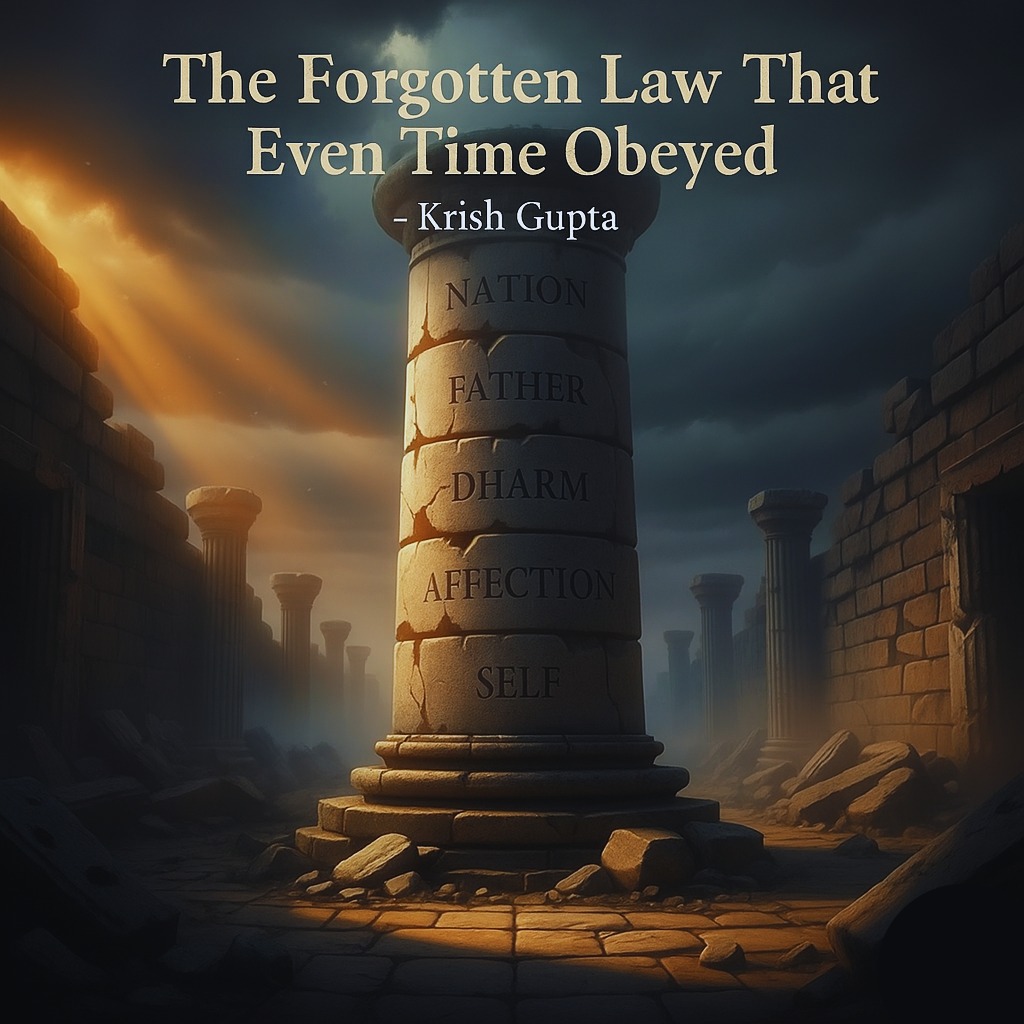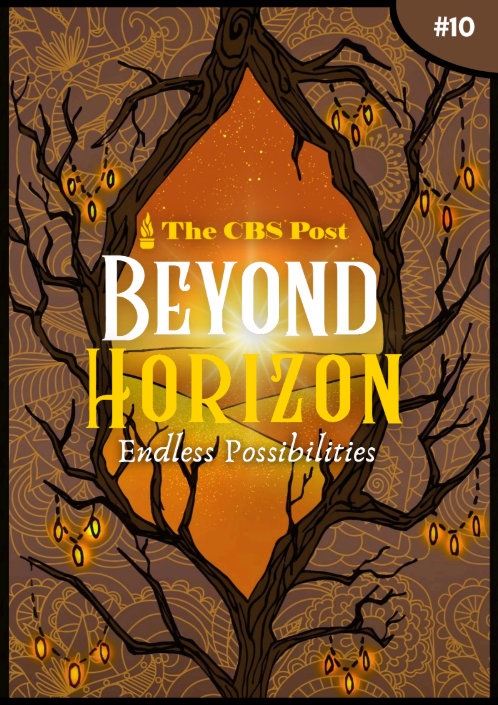The Forgotten Law That Even Time Obeyed
By Krish Gupta (BMS’27)
The world remembers only the noise of events, not the silence that guides them. Empires have fallen, kings have risen, faiths have clashed, and yet beneath every age runs the same quiet pulse, the law that decides what must come first. When this law is remembered, a civilization breathes in harmony; when it is forgotten, even the gods turn their faces away.
The ancients lived by it though they never carved it on stone. They did not learn it from scripture, for it was older than scripture itself – a rhythm woven into the breath of creation. Those who upheld the order of priorities became eternal; those who reversed it dissolved into the dust of time.
The land has always been first. Before borders had names, before the sky was divided by lines, the earth herself was sacred. The Vedas sang of Mātā Bhūmiḥ, putro’ham pṛithivyāḥ : the Earth is my mother, and I am her son. To protect her was not called patriotism; it was worship. From her soil came courage, and for her soil, kings laid down crowns. When a son defied his father for the sake of the people, when a prince chose exile over rebellion, when a warrior fought his kin to protect the innocent, it was the echo of the land speaking through their hearts.
Prahlad knew this before he even held a weapon. He bowed to his father Hiranyakashipu with devotion, for a father’s place was sacred. Yet when that father’s cruelty turned against the people, Prahlada stood unmoved. He refused to call tyranny divine. Not in rage, but in clarity. For the peace of the kingdom stood before blood. He chose not rebellion, but truth, the kind that can silence thunder. His father fell, yet the realm endured, for the child had remembered what even gods uphold- that the nation, the collective good, is the first dharma.
The father stands second, the axis upon which obedience and discernment spin. From him flows command, and through him, continuity learns its form. The Manusmriti whispers that the father is the first teacher, the guru of life, because he teaches not through sermon but through silent expectation. To obey him is to learn humility; to question him is to learn wisdom.
When Rama walked away from Ayodhya, it was not exile but preservation. The command came from his father, but behind that command lay the trust of a kingdom. He bowed not to a man, but to a promise, that the word of a father is the foundation of a person’s soul. He carried his exile as an offering to the integrity of the realm. When he returned, the very air trembled with relief, for dharma had not been broken, only delayed.
Bhishma (Devavrata, son of Ganga & Shantanu) stood upon this truth. For his father’s happiness, he laid aside a throne. His vow was so terrible that even gods hesitated to witness it. He surrendered not out of weakness, but out of devotion to paternal sanctity. His renunciation became Hastinapur’s spine for generations. It was not strength that made him immortal, but the surrender that steadied a kingdom.
And yet, obedience becomes a trial when it edges toward the divine. Parashuram learned this when his father Jamadagni commanded him to lift his weapon against the mother who bore him. He did not question. He obeyed. When Jamadagni restored her to life, the world saw not cruelty, but the razor-thin line between devotion and detachment. The act was not meant to glorify obedience, but to show that the father’s word sits above all, unless it unravels the harmony of creation itself.
Indrajit, born as Meghnath, stood upon that same line. He was a warrior unmatched, a man who had glimpsed the divine, yet when Lanka burned, he chose to stand by his father Ravan knowing well that dharma did not reside on his side. He fought not for victory, but for his father’s honor. He died as a son, not as a warrior. His devotion was pure, but his cause was lost. Through him, time spoke once more that the father is sacred, but when the father forgets the nation, the son must remember it.
Then comes dharma, the invisible law that neither favors nor forgives but simply balances. It is older than gods and deeper than mercy. The Bhagavad Gita called it swadharma– one’s inner truth, the purpose for which one is born (Karma). To betray it is to swim against the current of existence itself.
When Arjuna lowered his bow before battle, he did not waver in courage but in understanding. He saw teachers, elders, friends, and kin arrayed against him, and for a moment, he forgot which circle stood first. Then Krishna’s voice pierced illusion, dharma does not bend for affection, nor wait for comfort. Justice does not sleep until balance is restored. Arjuna’s war was not for conquest, but for restoration- to bring back the center that the world had lost.
Krishna himself lived by this rhythm. When his uncle Kamsa drowned Mathura in cruelty, affection could not blind him. He took no joy in striking him down, for blood still bound them. Yet dharma outweighed blood. Love had to bow before justice. The scriptures do not remember Krishna for his wars, but for his balance i.e. his refusal to let emotion rule duty.
Beyond dharma lies affection, that web of warmth which makes human life tender and tragic. It binds hearts, but it also blinds eyes. Love clouds judgment faster than ambition ever could. In Hastinapur, brothers who once shared laughter shared a war instead. The Mahabharat bleeds with the cost of misplaced affection.
Karna did not fall because he lacked skill or courage; he fell because he chose friendship over dharma. Bound by gratitude to Duryodhana, he stood on the side he knew was unjust. His loyalty was pure, but misplaced, for in serving a friend, he betrayed the balance that sustains the world. The Mahabharat remembers him not as a villain, but as a man torn between affection and righteousness. His arrows never missed their mark, yet his heart did.
In contrast, Krishna’s friendship with Sudama glowed like a lamp untouched by pride. When Sudama came to Dwarka, hungry and humble, Krishna, the supreme, knelt before him. He washed his feet and shared his own food. For him, the self held no place above affection. The world saw divinity bowing to simplicity, but time saw balance, where love neither blinded nor ruled, but completed the order.
Beyond all this lies the self, the smallest circle yet the loudest. The self that seeks comfort, pride, and unending validation. It is the spark of Atman spoken of in the Upanishads i.e. the eternal flame mistaken for the flicker of ego. When guided by dharma, the self builds empires of peace; when left alone, it devours them.
The Chanakya Niti warned of this: a man who serves himself above duty becomes his own enemy. The self, left unchecked, whispers of entitlement, of power, of comfort, until even the sacred turns to strategy. But when the self is placed last, it becomes a tool for creation rather than destruction. The sages called this Atma-Vinaya, the discipline of the soul.
And yet, this order has been tested again and again. The world has seen sons obey and disobey, kings renounce and reclaim, gods descend and ascend, all to remind humanity of this forgotten balance. When this order stands, harmony reigns. The nation shelters all, the father teaches, dharma guides, affection soothes, and the self fulfills. When it falls apart, chaos wears familiar faces. The self begins to rule, affection blinds, dharma becomes debate, the father’s word is mocked, and the nation fractures.
Time has watched it all. It saw kingdoms crumble when personal ambition overpowered duty. It saw families break when affection clouded justice. It saw rulers fall when they placed themselves above the realm. Even the gods, bound by their own vows, followed this order. Vishnu, in every incarnation, descended not for himself but to restore dharma, to realign what man had forgotten. When the balance tilted, creation called upon the eternal law once more.
Time does not judge, but it remembers. It remembers the son who obeyed to preserve order, the warrior who fought for balance, the god who smiled in surrender. It remembers Ram’s exile, Bhishma’s vow, Parashuram’s obedience, Arjun’s awakening, Karna’s loyalty, Krishna’s wisdom. Through each, the rhythm of life beat on, the same rhythm that the Vedas called Rita, the cosmic alignment, and the Manusmriti called Maryada, the sacred boundary of conduct.
And even now, when humanity builds towers instead of temples and scrolls through noise instead of thought, this order remains. Buried beneath desire, waiting. For in the soul of every being lies the memory of the same forgotten law, that the nation stands before the father, the father before dharma, dharma before affection, and affection before the self. Not as a chain, but as the design of harmony.
The moment one circle forgets the other, the music turns to noise. The self begins to shout, the heart begins to ache, and the world begins to stumble. And when the noise grows unbearable, the eternal voice rises again, not from the heavens, but from within the human heart, whispering the same truth it whispered to kings and gods alike: duty was never a burden; it was the melody that kept the universe in tune.
The stories have been told and forgotten, told and forgotten, yet time keeps telling them, for time knows, the order beneath the chaos is what makes life divine. This is the law that even I obey, for I have seen its end and its beginning, and they are the same. For when man forgets the order, I turn the wheel once more, until he remembers.
And so the rhythm continues. Empires fall. Kings rise. The soil breathes again. The law waits to be remembered.
For the universe does not move by chance, but by choice.
The choice to remember the forgotten law that even time obeyed.




Comments